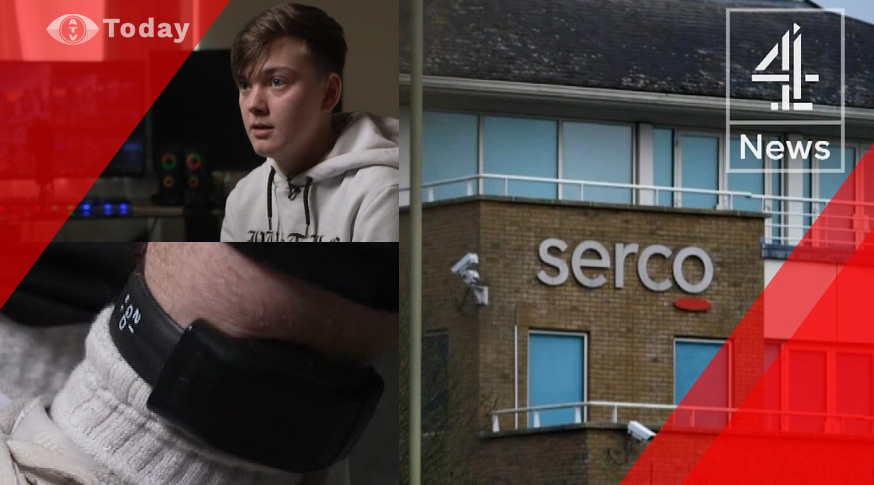The findings suggest some tagged offenders are not being actively monitored and more…
An investigation by Channel 4 News – produced by ITN – has uncovered claims of widespread and systemic failings in the electronic tagging service operated by Serco, the private contractor responsible for the government programme. Delays, communication breakdowns between Serco and HM Prison and Probation Service (HMPPS), and technical issues have allegedly left offenders in England and Wales unmonitored for weeks or even months despite court orders.
Since Serco took over the contract in 2024, financial penalties have been imposed every month due to poor performance. In April, Channel 4’s Dispatches first revealed how some offenders are going unmonitored for months after release from prison, after undercover reporters secretly filmed inside Serco for six weeks. Yet despite these problems, the Government is preparing to dramatically expand the use of electronic tagging, saying it will monitor tens of thousands more offenders in the community.
Speaking exclusively to Channel 4 News‘ Jackie Long, a Serco whistleblower, speaking under the pseudonym ‘Aaron’, has come forward to describe a system he says is “not fit for purpose”. He claims that the system is plagued by widespread issues, including offenders not being actively monitored, and failures to report breaches to police and probation authorities in real time.
“Trying to find genuine breaches, it was like a needle in a haystack because it was throwing out all these alerts that sometimes didn’t mean anything, but, there’d be thousands and thousands of them and we didn’t know how to identify the genuine breaches from all this traffic of data that was coming into the system”, he shared.
‘Aaron’ continues: “We’ve had somebody who they want to arrest for rape or potential assault, a serious assault of a victim and while they’re on the phone you’d look up the records to identify the person that they’re asking about.”
“And there’s been instances where we haven’t been able to give them that information because something has gone wrong when it’s been installed, or something’s happened in the system where the person has got a tag on, but we’re not actively monitoring them. So we’re not able to give them locations and there’s been instances where it’s been weeks and weeks where we think we’re monitoring someone but they’re not actively being monitored.”
One alarming case he highlights involved a domestic abuse victim who had died. Subsequent to her death, authorities sought GPS data from Serco on the location of the suspected perpetrator, who was already convicted for another offence and tagged, as part of their investigations – data Serco could not provide.
Expanding on his disclosures, ‘Aaron’ added: “There was talk in the monitoring centre of a particular case where one of the authorities, I think it was the police, had got in touch to say that there was an investigation into a victim who died and they needed GPS locations on her ex-partner who had offences of domestic violence. It did seem to point to him being potentially a suspect, but from what I heard we weren’t monitoring him effectively due to an error. So that is worrying.”
The revelations have raised questions about the Government’s ability to ensure public safety and the credibility of a justice system increasingly reliant on electronic monitoring to manage pressure on the overstretched prison estate. Among those impacted is Samuel Mattocks, a 21-year-old first-time offender given a community sentence following a knife possession charge.
Samuel was put on probation on 14 March and ordered to comply with an overnight curfew, enforced by an electronic tag. Despite the court order, Channel 4 News can reveal the tag was not fitted until ten weeks later, on 23 May. This was ten days before expiry of the tagging period.
“I really don’t feel like I’ve been held accountable for what I’ve done,” said Mattocks, who says he repeatedly alerted his probation officer about the delay, and kept his curfew voluntarily despite the lack of monitoring.
Commenting on the case, Serco told Channel 4 News:
“Whilst we do not normally comment on individual cases, we went above the requirements of our contract to fit a tag and monitor this individual. We visited on three separate occasions in the first few days after receiving a notification of a monitoring requirement. The individual was in breach of his conditions, which we reported to our colleagues in the Probation Service.”
Probation says from Serco’s first visit on 11 April until 6 May, Samuel was deemed to have withdrawn his consent to be tagged, because he had been at the wrong address. They say he was told at a meeting on 15 April to return to his original address which he confirmed he had done at a meeting the following week. Samuel says he had already notified the authorities about his change of address and had tried to contact both Serco and the Probation Service to ensure they had the correct one.
Probation added that after the consent was deemed withdrawn, it was up to Samuel to inform Serco himself that he did consent to be tagged. Mark Beattie, National Chair of the Magistrates’ Association, told Channel 4’s news show, “[we’re] very concerned about what we’re hearing. If we’re now being told it’s not being fitted for weeks, then you question whether tagging is an effective solution.”
Giving his reflections on what the revelations mean for victims, he added: “If they don’t trust that to protect them, then that’s a disaster, because the whole point of putting the tag on was to ensure that the alleged victim was safe.”
“I think we need to understand the scale of the problem. If they can’t now deliver what we have been ordering through the courts, then we have to understand what the recovery plan is. So at the point that it ramps up, we have to have confidence that they’re going to be ready to deliver it”.
He said that the alternative would be to have more people remanded. The Ministry of Justice has acknowledged delays in implementation and admits Serco’s performance is below acceptable levels. In a statement to Channel 4 News, Antony King, Managing Director of Citizen Services at Serco, said:
“We are proud of the challenging work our people do, working with multiple partners across the criminal justice system in delivering an essential and critical public safety service, often with complex and ever increasing requirements. Our performance continues to improve, which the MoJ recognise, and we continue to monitor record numbers of people in the community supporting our colleagues in probation and the Home Office.”
The Ministry of Justice commented: “While we cannot comment on individual cases, we dispute many of the claims being made. Tagging is an important and effective way to monitor and punish offenders and any delays are totally unacceptable. While the backlog of outstanding visits has been significantly reduced, Serco’s overall performance remains below acceptable levels.”
This investigation will air tonight, Monday 9 June, on Channel 4 News, and also available across Ch4News social platforms.











